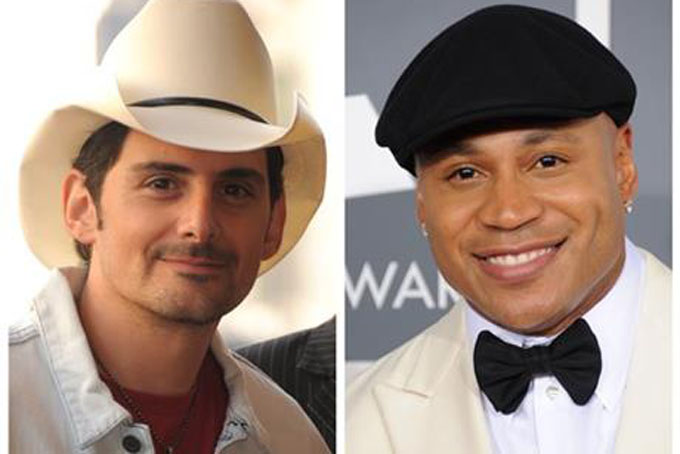
ON THE SPOT— This combination of file photos shows Brad Paisley, left, in Hollywood, Calif. on Nov. 1, 2011 and LL Cool J in Los Angeles on Feb. 10, 2013. (Photos by Jordan Strauss/Invision/AP, File)
by JESSE WASHINGTON
(AP)–Southern White men don’t usually drive racial dialogue. For as long as race has riven America, they have been depicted more often as the problem than the solution.
So after country music star Brad Paisley released his new song “Accidental Racist” last week, what happened next was hardly surprising: days of widespread criticism about his attempt to detail the challenges facing a “White man from the Southland” and his recruitment of LL Cool J to rap a Black perspective.
The song sparked a predictable blaze last week on TV, talk radio and the Internet. USA Today asked if it was an “epic fail.” At The Atlantic, Ta-Nehisi Coates titled his analysis, “‘Accidental Racist’ Is Actually Just Racist.” More than a few ridiculed it as “the worst song ever.”
Some elements of the outcry, however, raise less predictable questions: Where does naiveté turn into ignorance, and then into racism? What is the basis of modern Southern pride? And, possibly most important, should we grade racial attitudes on a curve?
Paisley begins the song with an anecdote about a Black man taking offense to his Confederate flag T-shirt. “The only thing I meant to say is I’m a Skynyrd fan,” Paisley sings, referring to the pioneering Southern rock group.
That scene actually happened to Paisley in real life, said Charlie Cook, programming director for West Virginia Radio Corp. and a member of the Country Music Association’s board of directors, who heard Paisley discuss the song with a group of industry executives.
“He sat down and thought about it from another person’s perspective and said, ‘If I offended you, it was accidental,'” Cook said. “I think it’s really from his heart.”
That doesn’t matter, say many of the critical voices. They say it’s the result that counts — a song that, to them, turns some of the most stinging flashpoints of American racial history into aw-shucks anecdotes. They are receiving a message very different from the one Paisley intended: the country-music staple of trying to figure out one’s experiences through song.
Ignorance is no excuse for Demetria Irwin, who savaged “Accidental Racist” in a piece on the Black news and culture website TheGrio.com.
“I think he had good intentions. I think he genuinely wanted to explore a topic,” Irwin, who is Black, said in an interview. However, “I don’t believe he doesn’t know what the Confederate flag symbolizes and what it means. There’s nothing accidental about that.”
“There’s also just a general entitlement that some White people might have, the whole White privilege thing, being totally unaware of Black culture in a real sense,” she added.
The song’s Black culture was provided by LL Cool J, whose verses were widely panned as shallow. Coates pointed out that while rap is full of artists who are passionate about racial issues, LL is not one of them.
“The only real reason to call up LL is that he is Black and thus must have something insightful to say about the Confederate Flag,” wrote Coates, who is Black. “The assumption that there is no real difference among Black people is exactly what racism is.”
Choosing LL, he said, is like “assuming that Paisley must know something about barbecue because he’s Southern.”
Being Southern comes with its own set of assumptions and stereotypes, some of them negative ones created by the low points of the region’s history. Southern pride is largely a defensive reaction to such stigmas, said Eric Weisbard, a music critic and American Studies professor at the University of Alabama.
